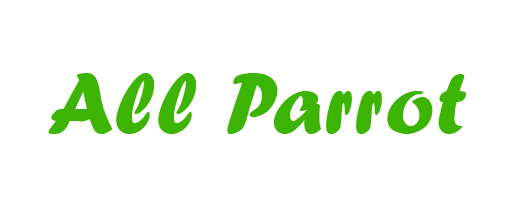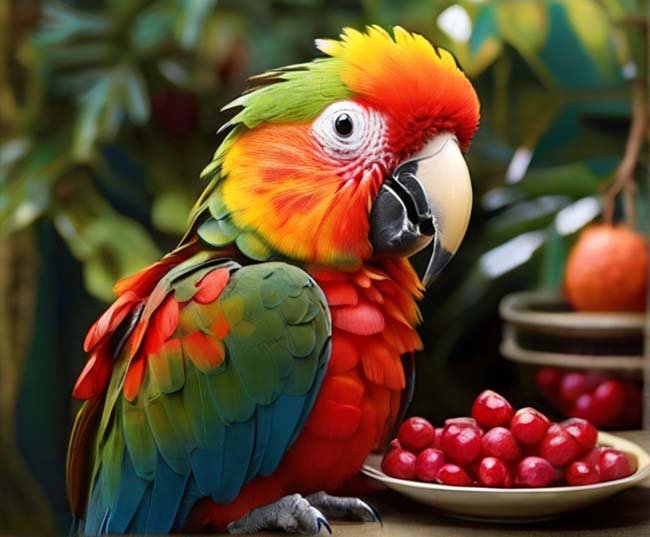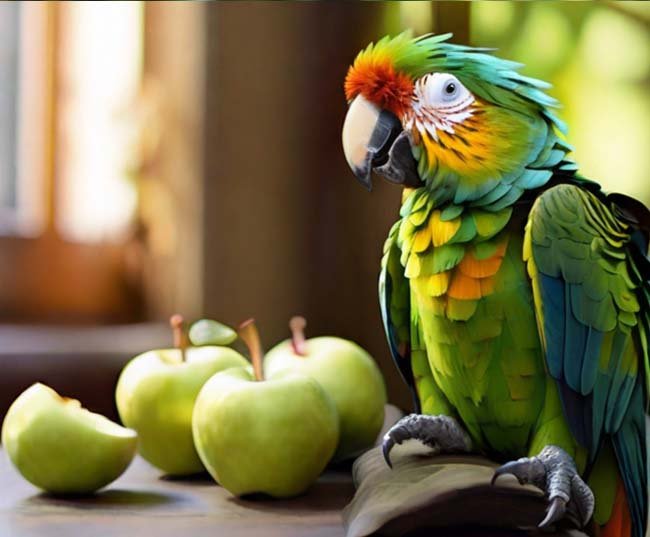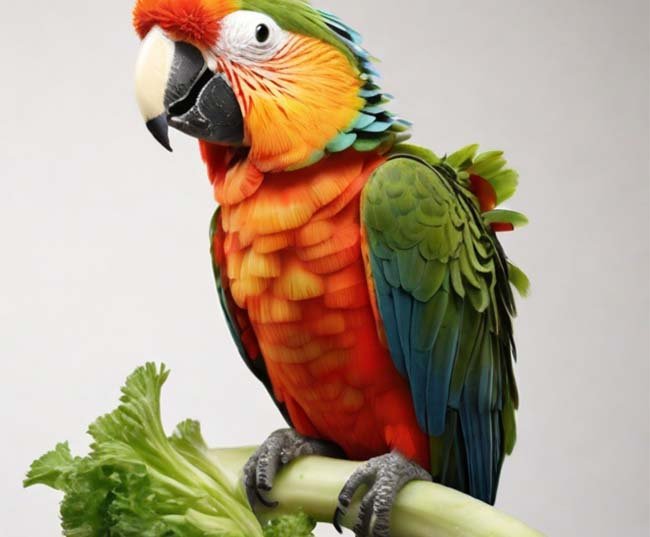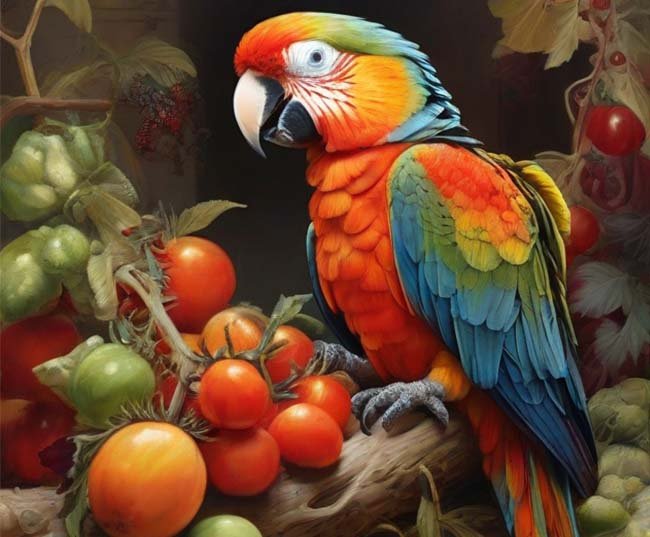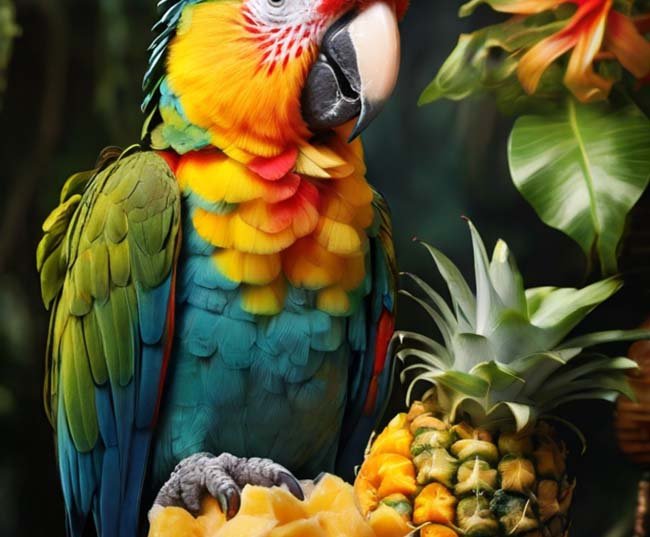Can Parrots Eat Pomegranate? Safe Feeding Tips
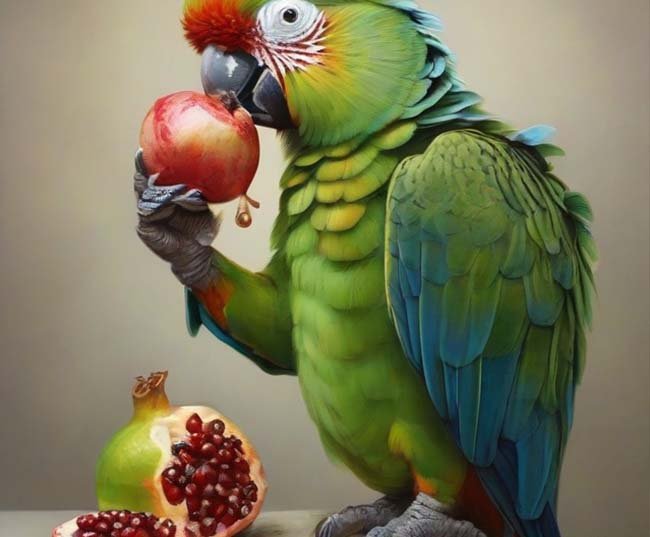
As a parrot owner, I am always on the lookout for new and nutritious foods to add to my feathered friend’s diet.
One fruit that caught my attention is pomegranate. But before incorporating any new food, I want to ensure that it is safe and provides the necessary nutritional value for my parrot.
In this article, we will explore whether it is safe for parrots to eat pomegranate.
We will also provide useful tips on how to incorporate pomegranate into their diet to ensure optimal avian nutrition.
So without any delay, let’s dive into it.
Key Takeaways:
- Parrots require a balanced diet with a mix of fruits, vegetables, seeds, and pellets.
- Pomegranate is a nutrient-rich fruit with several health benefits for parrots.
- When feeding pomegranate to parrots, it is crucial to remove all the seeds and membranes to avoid choking hazards and digestive issues.
- Pomegranate can be offered as a treat or mixed with other fruits, but moderation is key.
- Any signs of discomfort or digestive issues should be addressed promptly, and avian veterinarians should be consulted for potential allergies or sensitivities.
Can Parrots Eat Pomegranate? Explained
Parrots can eat pomegranate seeds and enjoy them as a tasty, healthy treat! The juicy red seeds inside a pomegranate fruit are fine for parrots to eat.
Pomegranate seeds contain lots of vitamins, minerals, and antioxidants that are good for a parrot’s body.
When giving pomegranate to your parrot, be sure to remove the white pithy part of the fruit – this part can be bitter and dry.
Just feed your parrot the bright red juicy seeds. Offer only a few seeds at a time, since pomegranate seeds have natural sugars.
Too many can cause weight gain. The seeds can also stain your parrot’s beak temporarily red – but don’t worry, it washes off!
So yes, add a few pomegranate seeds to your parrot’s diet for a nutritious snack. Just don’t overdo it. Your feathered friend will enjoy the sweet tart taste of this healthy fruit!
Read: Can Parrots Eat Grapes? Safety & tips Guide
1). Understanding Parrot Diets
As a responsible parrot owner, it’s essential to know what makes up a healthy diet. Parrots are omnivorous and require a balanced mix of fruits, vegetables, seeds, and pellets to thrive.
The right balance of nutritional requirements depends on your parrot’s species, size, age, and activity level.
1). Seeds and Pellets
Seeds and pellets should make up the bulk of your parrot’s diet as they provide necessary nutrients like protein and carbohydrates.
A high-quality seed mix should contain a variety of seeds like millet, sunflower, and safflower seeds, and they should be offered in moderation.
Pellets are an excellent complement to seeds and usually contain a balanced mix of vitamins and minerals.
They’re highly recommended by veterinarians as they ensure a complete and balanced diet for your feathered friend.
Check with your vet for specific brand recommendations and portion sizes.
2). Fruits and Vegetables
Parrots also need plenty of fresh fruits and vegetables in their diet. Some safe fruits to offer include apples, berries, bananas, and oranges.
It’s best to offer a range of colorful fruits to ensure a variety of vitamins and antioxidants.
When it comes to vegetables, aim for a mix of leafy greens like kale and spinach and colorful veggies like carrots and pumpkin.
Avoid feeding your parrot more than one serving of high oxalic acid vegetables like broccoli and Swiss chard to prevent potential calcium deficiency.
3). Other Foods
Parrots may enjoy other human foods like pasta, rice, and eggs, as long as they’re offered in moderation.
Avoid feeding fatty and high-sugar foods like chocolate, avocado, and candy as they may have adverse effects on your parrot’s health.
4). Water
Finally, always ensure that your parrot has access to clean, fresh water.
Change the water daily and avoid adding anything to it like supplements or vitamins as it may contaminate the water.
2). Exploring Pomegranate Nutritional Value
Pomegranate is a fantastic addition to your parrot’s diet, with a long list of potential health benefits.
This nutrient-packed fruit is rich in vitamins and minerals, including vitamins C and K, fiber, and potassium.
It also contains several antioxidants that can help reduce inflammation and support immune function.
When combined with a balanced diet, feeding your parrot pomegranate can help provide the necessary vitamins and nutrients for a healthy avian lifestyle.
But don’t exclusively rely on pomegranate to keep your feathered friend in good health!
While it certainly offers excellent benefits, it’s vital to remember that parrots need a wide variety of healthy foods to build a resilient and robust immune system.
Comparing the Nutritional Value of Fruits for Parrots
| Fruit | Antioxidants | Fiber | Potassium |
|---|---|---|---|
| Pomegranate | Yes | Excellent | Excellent |
| Apples | No | Good | Excellent |
| Blueberries | Yes | Good | Good |
| Bananas | No | Fair | Excellent |
As you can see in the comparison table above, pomegranate provides an excellent source of antioxidants, fiber, and potassium compared to other popular fruits.
However, each different fruit offers its unique combinations of nutrients, so it’s best to incorporate a diverse mix of fruits into your parrot’s diet to ensure optimal results.
So, while pomegranate can be a beneficial addition to your parrot’s diet, it’s essential to remember that feeding your pet a balanced, varied diet is the absolute best way to ensure a long and healthy life.
Including a diverse range of healthy foods, including but not exclusively fruits, is key to ensuring that your feathered friend enjoys all the potential benefits of a nutritious diet.
3). Can Parrots Safely Eat Pomegranate?
Parrots can safely consume pomegranate as long as it is prepared and offered correctly.
However, there are precautions to keep in mind to ensure their safety. Pomegranate seeds can pose a choking hazard or cause digestive issues, while the membranes can be difficult for parrots to digest.
Before feeding pomegranate to your parrot, make sure to remove all the seeds and membranes.
Offering pomegranate in moderation is best, alongside a balanced variety of other fruits, vegetables, seeds, and pellets.
It is also important to monitor your parrot’s health and digestion when introducing new foods to their diet.
If you notice any adverse reactions after feeding pomegranate, consult with an avian veterinarian.
4). Preparing Pomegranate for Parrots
When it comes to feeding pomegranate to parrots, it’s important to prepare it safely to avoid any potential risks.
Parrots should not be given the seeds or membranes of the fruit. The seeds can be a choking hazard, and the membranes can be difficult for parrots to digest.
To prepare pomegranate for your feathered friend, start by washing the fruit thoroughly to remove any pesticides or dirt.
Afterward, you can use a sharp knife to make a shallow cut around the fruit’s circumference, making sure not to cut too deep.
Next, take your fingers and gently separate the two halves of the fruit. This will expose the ruby-red arils, which are the fleshy seed casings.
You can now use a spoon or your fingers to scoop out the arils and place them in a separate bowl.
Avoid giving your parrot any of the white membranes surrounding the arils as it can be challenging to digest.
You can serve the pomegranate as a standalone treat or mix it with other fruits to create a nutritious blend.
Remember, feeding pomegranate to your parrot is about quality over quantity.
While pomegranate offers several health benefits, it should be given in moderation alongside a balanced variety of other fruits, vegetables, seeds, and pellets.
5). Introducing Pomegranate to Parrots
Feeding pomegranate to your parrot can be a nutritious addition to their diet.
However, it is important to introduce any new food gradually and monitor their response. Some parrots may take time to get used to the new taste and texture of pomegranate.
Start by offering small pieces of pomegranate to your parrot. If they show interest and eat it without any issue, gradually increase the amount.
Avoid offering large pieces or too much at once, as this may cause digestive problems.
It is also essential to remove all the seeds and membranes to avoid choking hazards or digestive issues in your parrot.
Once you have successfully introduced pomegranate into their diet, experiment with incorporating it alongside other fruits, vegetables, seeds, and pellets to ensure a balanced diet.
6). Incorporating Pomegranate into Parrots’ Diet
Parrots love to eat fruit, and pomegranate is no exception. This nutrient-rich fruit can be a great addition to a parrot’s diet when prepared correctly.
Pomegranate can be offered as a treat or mixed with other fruits to create a nutritious blend.
However, it’s important to balance the amount of pomegranate with other fruits, vegetables, and other dietary components.
When introducing pomegranate to your parrot, start with small amounts and monitor their response.
Some parrots may take time to adjust to the new taste and texture, so it’s essential to be patient with your bird.
Mixing pomegranate with other fruits can help your parrot get used to the new flavor and texture.
Remember that while pomegranate is a healthy fruit for parrots, it should not make up the majority of their diet.
Offer a variety of fruits, vegetables, seeds, and pellets to ensure they receive all the nutrition they need.
By incorporating pomegranate into a balanced diet, you can provide your parrot with the necessary nutrients for a long and healthy life.
7). Monitoring Parrot’s Health
As an owner of parrots, one should always ensure that their feathered friend stays hale and hearty.
This means paying close attention to their health and well-being. When incorporating pomegranate into their diet, watch out for any signs of discomfort or digestive issues.
Some indicators may include diarrhea, vomiting, or sudden changes in appetite. If you notice any of these symptoms, it’s important to address them promptly by consulting with a veterinarian.
In addition to monitoring any physical changes, one can also observe their behavior for changes.
Some parrots may develop aversions to certain types of food, even if they enjoyed them before.
Others may show unusual lethargy or vocalization changes. Keep an eye on any changes in behavior or mood and make sure to take action if needed.
By staying vigilant, we can ensure that our parrots consume a balanced and nutritious diet that includes pomegranate and other foods rich in avian nutrition.
8). Potential Risks and Allergies
Though pomegranate is generally safe for parrots, there is still a potential risk of allergies or sensitivities.
It is crucial to monitor your parrot closely for any adverse reactions after feeding pomegranate.
If you notice any gastrointestinal discomfort or any unusual symptoms whatsoever, immediately consult an avian veterinarian.
Seeking professional advice is essential in preventing serious health issues for your feathered friend.
Always prioritize your parrot’s health and safety when introducing new foods to their diet.
Taking the necessary precautions, monitoring your parrot, and consulting a vet can help ensure that your parrot stays healthy and happy.
Pomegranate safety for parrots should be taken seriously, and any concerns should always be addressed immediately.
9). Other Fruits Suitable for Parrots
Parrots need a varied and balanced diet to thrive, and incorporating fruits is an important part of it.
Along with pomegranates, there are many other fruits suitable for parrots to eat. Here are some of the best options:
| Fruit | Benefits for Parrots |
|---|---|
| Apples | Rich in vitamin C and fiber, can help clean parrot’s beak and aid digestion. |
| Blueberries | High in antioxidants and vitamin C, can aid in maintaining cognitive function and boost immunity. |
| Bananas | Loaded with potassium and vitamin B6, can help regulate blood pressure and improve energy level. |
When introducing new fruits to your parrot, always start with a small amount and monitor their response.
Always ensure that the fruits offered are safe for parrots and never give them spoiled or rotten fruits.
By incorporating a variety of fruits into their diet, your feathered friend will enjoy a tasty and nutritious meal!
Conclusion
In conclusion, pomegranate can be a safe and nutritious addition to a parrot’s diet when prepared properly.
As with any dietary change, it is important to monitor your parrot’s health and digestion and consult with an avian veterinarian if you have any concerns.
Remember to remove all seeds and membranes before offering pomegranate to your parrot, and balance the amount of pomegranate with other fruits, vegetables, seeds, and pellets.
Pomegranate is just one of many safe fruits for parrots to consume, and a varied diet is key for their optimal avian nutrition.
By considering these tips and precautions, you can safely and confidently incorporate pomegranate into your parrot’s diet, providing them with essential nutrients and a tasty treat.
So the answer to the question, “Can Parrots Eat Pomegranate?” is yes, as long as it is done safely and in moderation.
Frequently Asked Questions
Can parrots safely eat pomegranate?
Yes, parrots can safely consume pomegranate as long as it is prepared and offered in the right way. However, there are a few precautions to keep in mind to ensure their safety.
How should I prepare pomegranate for my parrot?
To safely feed pomegranate to parrots, it is essential to remove all the seeds and membranes. The seeds can be a choking hazard and the membranes can be difficult for parrots to digest.
How should I introduce pomegranate to my parrot?
When introducing pomegranate to your parrot, start with small amounts and monitor their response. Some parrots may take time to adjust to the new taste and texture.
How can I incorporate pomegranate into my parrot’s diet?
Pomegranate can be offered as a treat or mixed with other fruits to create a nutritious blend. Remember to balance the amount of pomegranate with other fruits, vegetables, and other dietary components.
Can parrots eat other fruits besides pomegranate?
Pomegranate is just one of the many fruits that can be offered to parrots. Explore other safe options such as apples, blueberries, and bananas to provide a varied diet for your feathered friend.
Should I monitor my parrot’s health when feeding pomegranate?
As with any addition to a parrot’s diet, it’s important to monitor their health and digestion when feeding pomegranate. Any signs of discomfort or digestive issues should be addressed promptly.
Are there any potential risks or allergies associated with feeding pomegranate to parrots?
While pomegranate is generally safe for parrots, some birds may develop allergies or sensitivities. If you notice any adverse reactions after feeding pomegranate, it is best to consult with an avian veterinarian.
What should I do if my parrot has a negative reaction to pomegranate?
If you notice any adverse reactions in your parrot after feeding pomegranate, it is best to consult with an avian veterinarian for proper guidance and advice.
